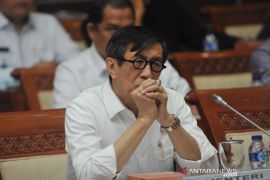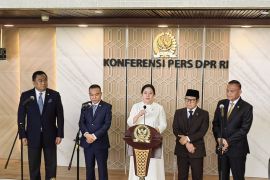"I told the coordinating minister (for economic affairs), bank account holders in 2019 should reach at least 76 percent (of the population), from the current 36 percent," the president said.Jakarta (ANTARA News) - President Joko Widodo (Jokowi) has set a target for at least 76 percent of the countrys population to have bank accounts by 2019.
"I told the coordinating minister (for economic affairs), bank account holders in 2019 should reach at least 76 percent (of the population), from the current 36 percent," the president told a gathering of 100 economists here, Tuesday.
The increase in the number of bank account holders is aimed at improving financial inclusion.
"Public savings is expected to strengthen investment in Indonesia," Jokowi noted.
A campaign to encourage people to save their money in banks should be conducted continuously, reaching all elements of society, including students, farmers, and fishermen, Jokowi added.
On the occasion, the head of state also noted the importance of human resource development and the need to develop vocational schools to create ready-to-work human resources.
"Vocational schools must be transformed. They should have 70-80 percent training. Now, almost 70 percent of the teachers are regular ones; there is no training nor trainers," he remarked, adding that the vocational training conducted by educational institutions in cooperation with the Indonesian Chamber of Commerce should be improved.
He also cited the need to develop infrastructure, which has become crucial for economic development in Indonesia.
"The current inadequate infrastructure has pushed our logistical costs 300 percent higher than those in a neighboring country. I believe that once this infrastructure project is completed, logistics and transportation costs could become cheaper," he said.
President Jokowi highlighted the problem of corruption and inefficiency in bureaucracy. "This is not an easy task, but the governments policy packages will minimize inefficiency," he claimed, citing the example of the obligation of bureaucrats to issue multiple accountability reports.
"They wasted 60-70 percent of their energy on making such reports," he noted.
He admitted that it was difficult for them to meet with farming instructors in the field because they were busy creating 16-44 accountability reports in their offices. "This is our bureaucratic inefficiency. I think two reports are enough, and field control management is more important." (*)
Editor: Heru Purwanto
Copyright © ANTARA 2016










